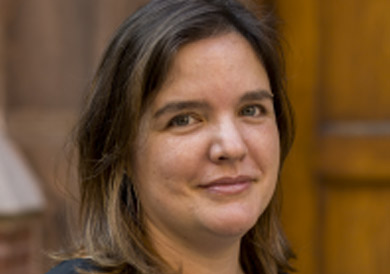TC's Kitzmiller in the Hechinger Report: Where did we go wrong in teaching in a democracy?
The following piece, Donald Trump and teaching in a democracy: Where did we go wrong?, by Erika Kitzmiller, appeared in the Hechinger Report on November 10, 2016.

On Tuesday, millions of Americans went to the polls to elect the next president, ending what has been one of the most vitriolic campaigns in history. For educators across the nation, it has been a trying time.
Most educators believe that schooling is a place for children to deliberate ideas, to weigh different perspective, to learn about our past. We also have a deep belief that children can learn about the history of this country — its triumphs and mistakes — to create a better future.
[ Post-Election America: Read more commentary on the election from Teachers College ]
Schooling is a place for youth to learn the practices of democratic engagement, to consider different perspectives, and articulate one’s own ideas about the world around them. It is why many of us, who have a deep belief in our democracy, chose to teach.
And yet, as an educator and historian who grew up in Red America, a place where nearly everyone is voting for a misogynist, xenophobic, racist candidate, it’s easy to feel like a failure: That we, as educators, have failed to teach skills for students to engage in this democracy, to understand this nation’s misogynist, xenophobic, and racist past, and to grasp the threat that this inflammatory rhetoric has on our standing in the world.
I am not alone. Teachers across the nation have questioned what they did wrong.
A friend who taught in the Philadelphia public schools for nearly four decades said that the presidential election made her feel like the schools had failed to do their job; that her work, as high school teacher, had failed to help her students understand the importance of democratic engagement.
Last week, a former kindergarten teacher and education professor acknowledged that it would be easy to dismiss these hateful ideas as stupid, but then, wondered how schools had contributed to the current political climate.
How have we, as educators, failed to teach white students about social studies? How have we, as educators, miseducated our youth? And now we are facing the challenges of how we tell them what happened, why we have a person as president who may not reflect our and/or their values.
As I sat at home this summer, listening to the college-educated bourgeois parents of my childhood friends talk about why they supported Trump and watched my Facebook feed fill with the same hateful speech that has come to characterize this election, it’s difficult for educators, like me, to wonder what we could have done differently: To ask how schools have contributed to the misogyny, xenophobia, and racism that we have all witnessed over the past few months; to feel like we, as educators, have failed.
But, the shortcomings of our schools do not rest with the teachers — a trope that many individuals would want us to believe. No, it’s a collective failure that we have all been part of over the past two decades.
By passing and supporting legislation that privileges narrow testing over deliberative action, this nation has promoted a narrow sense of education.
It has promoted an education that is bound by the limits of standardized tests and rote memorization and that leaves little if any room for students to learn about this nation’s past, to engage in social studies or to learn scientific methods. This sense of education is also one that stresses individual outcomes on state-mandated assessments rather than collective uplift and authentic learning.
It is a sense of education that negates the central role of schooling to the development of democratic skills and makes it virtually impossible for these children — many of whom attended school under these high stakes reforms and who are now old enough to cast their first presidential vote — to weigh evidence and dissent respectfully.
There is so much that we need to do to heal and recover from what has happened during this election cycle. But, perhaps, we could start with our schools.
Perhaps, we could restore the foundation that our public schools were founded on — the notion that America’s public schools were founded to promote civic engagement and deliberative skills—skills that our democracy depended on to survive and thrive.
Perhaps, we could expand our curriculum to include the history of failures — to move our teachings from celebration and progress to evaluate the times when we, as Americans, failed to respond to misogyny, xenophobia, and racism. And we might examine how these moments affected us all.
Perhaps we might educate our children about the promises and perils of this democratic nation that they will eventually inherit so that they truly understand the role that they have to play in preserving and promoting the democratic process for us all.
Erika M. Kitzmiller Ph.D. is a lecturer in the program in Social Studies at Teachers College, Columbia University and a Research Associate at Harvard University’s Hutchins Center. A historian of race, education, and inequality she is currently finishing a book manuscript, The Roots of Inequality.
Published Friday, Nov 11, 2016